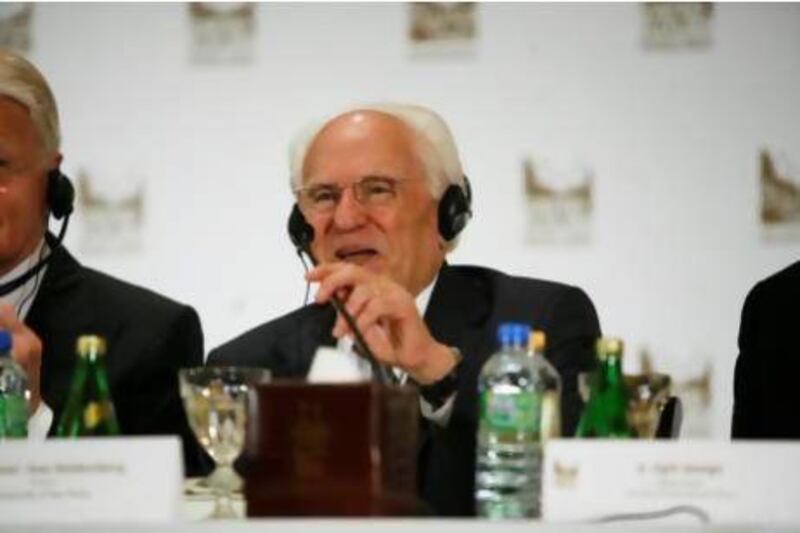ABU DHABI // Prof Jose Goldemberg, whose studies into sugarcane ethanol as fuel helped to promote biofuels in his native Brazil and beyond, was yesterday named the Lifetime Achievement Award recipient for the Zayed Future Energy Prize.
“As a scientist, I always believed that science can change the world and that the future does not predetermine the past but we have choices,” Prof Goldemberg told a high-profile audience at a ceremony held at the Emirates Palace.
He is one of eight finalists that share a total of US$3.9 million (Dh14.3m) in prize money.
He received his award from Sheikh Mohammed bin Zayed, Crown Prince of Abu Dhabi and Deputy Supreme Commander of the Armed Forces.
Prof Goldemberg said he was “deeply honoured” to receive the accolade.
After the ceremony, Prof Goldemberg said that while he had not personally met the late President Sheikh Zayed, whose memory the award honours, he shares his legacy.
“He was not a scientist but he got it right,” said Prof Goldemberg, referring to Sheikh Zayed’s focus on sustainable development.
“The present energy system has two fundamental problems - one of them is security of supply and the second is exhaustion of hydrocarbons, they are not going to last for ever.”
Currently in his 80s, Prof Goldemberg is working actively as a scientist and will use a fraction of his US$500,000 money to support his research.
“Scientists are not well-paid al of their live, as we all know,” he said jokingly.
The winners this year were chosen from a list of 24 finalists by a jury chaired by Ólafur Ragnar Grímsson, President of the Republic of Iceland. Altogether, the award received 579 entries. President Grímsson commented on Prof Goldemberg’s extraordinary career.
“By giving the lifetime we are also saying one individual can transform the world and we are also saying none of us have excuses not to make a contribution,” he said.
Launched and managed by Abu Dhabi clean energy company, Masdar, the award honours the late founding father and President of the United Arab Emirates, Sheikh Zayed bin Sultan al Nahyan. Now in its fifth year, the award is part of Abu Dhabi Sustainability Week, which continues in the capital until Thursday.
The list of winners also included German technology giant, Siemens LLC. The company was chosen as the winner in the large corporation segment. Winners in this category do not receive monetary prize, just recognition. Japan’s Sharp Corporation and the BYD Company Limited, one of China’s fastest growing automotive and renewable energy companies, were also competing in the same category.
The award also looks to recognise small and medium-size companies with US$1.5 million given to the winner. An American for-profit social enterprise, d.light Design, won the accolade for its work on providing low-cost energy solutions to the developing world. The company has sold more than 1.5 million solar lanterns to people in the developing world.
The company was one of five competitors in the category. The line-up included another American company, Clean Power Finance, as well as Belgium’s EcoNation, which has developed the world’s first motorised and intelligent system to capture and enhance daylight. The list also included Mainstream Renewable Power, an Irish company with a development pipeline of 15 gigawatts of solar and wind projects around the world, and Bangladeshi enterprise, Grameen Shakti, which offers solar home systems to people in the country’s rural areas.
The award also features a category for non-governmental organisations. This year, Ceres a United States-based entity, which uses investor influence to pressure companies, industries and regulators to reduce their carbon emissions, was awarded the US$1.5 million prize.
For the first time this year, several high-schools from Europe, Asia, Africa and the Americas world will be distinguished with each winner receiving US100,000. The winners were Mexico’s Secundaria Tecnica 120 School, Okehampton College from the United Kingdom and the Sheikh Khalifa Bin Zayed Bangladesh Islamia School in Abu Dhabi.
The award is also open for schools in Oceania but this year, no school from that region met the eligibility criteria, the organisers said. The Global High School Prize also falls under the UAE's commitment to the UN Secretary General's Sustainable Energy for All initiative.
vtodorova@thenational.ae





